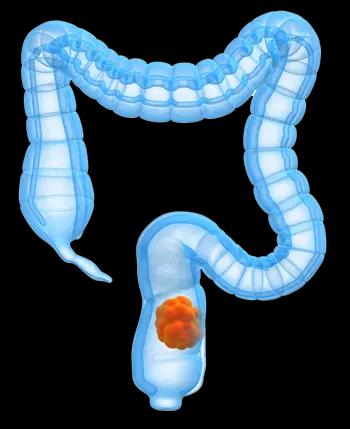Colorectal cancer, also known as colon cancer and rectal cancer is a malignant disease affecting the colon and rectum and has long been a significant public health concern. While it is the third most common cancer in the United States, the good news is that it is also one of the most preventable and treatable forms of cancer when detected early. The key to effective prevention and early intervention lies in understanding the timeline of colorectal cancer development, which can span over a decade in many cases.
The slow and steady progression of colorectal cancer
Colorectal cancer is a slow-moving process, typically taking around 10 years to progress from the initial formation of a polyp to the development of a life-threatening type of cancer. This extended timeline offers a valuable window of opportunity for early detection and treatment, which can significantly improve patient outcomes.
Polyp-to-cancer transformation
The journey of colorectal cancer begins with a single gene mutation in one of the countless cells lining the colon or rectum. These cells are in a constant state of division, and with each division, any mutations can be passed on and accumulated. As mutated cells build up on the colon’s lining, they can form a small growth known as a polyp.
Over time, as the mutated cells continue to grow and divide at a faster rate, the polyp may eventually transform into a cancerous tumour. Fortunately, the vast majority of polyps do not become cancer cells but the potential for this transformation is enough to warrant close monitoring and removal of any polyps detected during a colonoscopy.
The 10-year timeline
The gradual progression from a harmless polyp to a deadly cancer is a slow process that typically takes around a decade. This extended timeframe is why regular colorectal cancer screenings are so crucial – they provide the opportunity to identify and remove precancerous polyps before they have a chance to develop into full-blown cancer.
Early detection: The key to effective cancer treatment
The slow-moving nature of colorectal cancer development is a double-edged sword. While it allows for early-stage detection and intervention, it also means that the disease often does not cause noticeable symptoms until it has reached a more advanced stage. This highlights the importance of regular screening tests, as it can help identify the disease before it becomes life-threatening. When untreated, colorectal cancer can cause blockage in the bowel, spreading cancer to other tissues or organs (metastasis), and can develop into second primary colorectal cancer
Colon cancer screening recommendations
The American Cancer Society recommends that individuals begin colorectal cancer screening at age 45, with earlier testing encouraged for those with elevated risk factors, such as a family history of the disease. The gold standard for colorectal cancer screening is the colonoscopy, which allows for both the detection and removal of precancerous polyps.
Other screening options, such as at-home stool tests, can also be effective, but they are not as accurate as a colonoscopy and do not eliminate the need for follow-up procedures if abnormalities are detected.
The importance of early diagnosis
Early detection of colorectal cancer is crucial, as it can significantly improve patient outcomes. When caught at a localised stage, the 5-year survival rate for colorectal cancer is an impressive 90%. However, if the cancer has spread to distant organs, the 5-year survival rate reduces to just 14%.
By encouraging regular screening and raising awareness of the potential warning signs, healthcare providers can help ensure that colorectal cancer is detected and treated as early as possible, maximising the chances of a positive outcome for patients.
Recognising the warning signs
While colorectal cancer often does not cause noticeable symptoms until it has reached a more advanced stage, certain warning signs can signal the presence of the disease, even in younger adults. By being aware of these signs and seeking medical attention promptly, individuals can increase the chances of early detection and successful treatment.
Potential warning signs in younger adults
Recent research has identified four key warning cancer symptoms that may indicate the presence of colorectal cancer in younger adults (under the age of 50):
- Abdominal pain
- Rectal bleeding
- Diarrhea
- Iron deficiency anaemia
Having just one of these signs during the 3-month to 2-year period before diagnosis was associated with nearly twice the likelihood of being diagnosed with early-onset colorectal cancer. The more signs a person has, there is a high risk of being diagnosed with the disease.
Importance of seeking medical attention
If a younger adult experiences any of these warning signs, it is crucial that they do not ignore them and instead seek medical attention as soon as possible. While these signs may not necessarily indicate colorectal cancer, they should be evaluated by a healthcare professional to rule out the possibility of the disease or to start early intervention if it is present.
By encouraging younger adults to be proactive about their health and to report any concerning symptoms to their doctors, healthcare providers can help ensure that colorectal cancer is detected and treated as early as possible before it has a chance to progress to a more advanced and potentially life-threatening cancer stage.
The role of genetics in colorectal cancer development
In addition to the slow-moving nature of colorectal cancer development, genetic factors also play a significant role in the disease’s progression and risk of occurrence.
Inherited genetic mutations
Certain inherited genetic mutations, such as Lynch syndrome and familial adenomatous polyposis can significantly increase an individual’s risk of developing colorectal cancer. Individuals with a strong family history of the disease or known genetic predispositions may require more frequent screening and closer monitoring to ensure early detection and intervention.
Acquired genetic changes
While inherited genetic mutations can contribute to colorectal cancer risk, the majority of cases are the result of acquired genetic changes that occur during a person’s lifetime. These changes can be influenced by a variety of environmental and lifestyle factors, such as diet, physical activity, and exposure to carcinogens.
The importance of genetic testing
For individuals with a family history of colorectal cancer or other risk factors, genetic testing can be a valuable tool in assessing their risk and informing their screening and prevention strategies. By identifying the presence of specific genetic mutations, healthcare providers can tailor their approach to each patient’s unique needs and ensure that any necessary interventions are started promptly.
Challenges in colorectal cancer screening and detection
Despite the well-established benefits of regular colorectal cancer screening, there are still significant challenges that hinder the widespread adoption and effectiveness of these preventive measures.
Concerns about the screening test
One of the primary challenges is the reluctance of many individuals to undergo colorectal cancer screening, particularly the colonoscopy or sigmoidoscopy procedure where a biopsy is taken. Factors such as fear, discomfort, and concerns about the preparation process can deter people from scheduling and completing their recommended screenings.
Unequal access to care
Another significant challenge is the unequal access to colorectal cancer screening and early detection services, particularly among underserved and marginalised communities. Socioeconomic status, insurance coverage, and geographic location can all play a role in determining an individual’s ability to access timely and high-quality cancer care.
Limitations of current screening methods
While colonoscopy is considered the gold standard for colorectal cancer screening, it is an invasive procedure that requires specialised equipment and trained healthcare providers. This can limit the availability and accessibility of the procedure, especially in areas with limited healthcare resources.
Advancements
Despite the challenges, ongoing cancer research and innovation are driving significant advancements in the field of colorectal cancer detection and treatment, offering new hope for improved patient outcomes.
Emerging screening technologies
Researchers are exploring the development of new, less invasive screening methods, such as blood-based tests and stool-based DNA tests, which could potentially increase screening adherence and broaden access to early detection services.
Targeted therapies and immunotherapy
This treatment targets the genes, proteins and tissues that help colon cancer cells grow and multiply. Offering new treatment options for patients with advanced or recurrent colorectal cancer.
Personalised approaches to care
As our understanding of the genetic and molecular underpinnings of colorectal cancer continues to evolve, healthcare providers are increasingly adopting personalised approaches to care, tailoring treatment strategies to the unique characteristics of each patient’s disease.
The future of colorectal cancer prevention and management
Looking ahead, the future of colorectal cancer prevention and management holds great promise, with a focus on early detection, targeted interventions, and a more comprehensive, patient-centered approach to care.
Enhancing screening and early intervention
By addressing the barriers to screening adherence, improving access to high-quality colorectal cancer care, and introducing innovative screening technologies, healthcare providers and policymakers can work to ensure that more individuals can benefit from the life-saving potential of early detection and intervention.
Personalised risk assessment and tailored interventions
As our understanding of the genetic and environmental factors that contribute to colorectal cancer risk continues to grow, healthcare providers will be better equipped to assess each individual’s unique risk profile and implement personalised prevention and management strategies.
Holistic approaches to cancer care
Recognising the nature of colorectal cancer, healthcare systems are increasingly adopting a more comprehensive, patient-centred approach to care, integrating various medical specialities, supportive services, and patient education to ensure that individuals receive the most effective and compassionate care throughout their cancer journey.
Conclusion
Colorectal cancer is a complex and challenging disease, but the good news is that it is also one of the most preventable and treatable forms of cancer when detected early. By understanding the slow and steady progression of the disease, recognising the potential warning signs, and embracing the advancements in screening, detection, and treatment, we can work together to reduce the burden of colorectal cancer and improve patient outcomes for years to come.
Sources
- How Fast Does Colon Cancer Grow and Progress?
- Colon and Rectal Cancer Guide | If You Have Colorectal Cancer | American Cancer Society
- Possible Signs of Colorectal Cancer in Younger Adults – NCI
Medical Disclaimer
NowPatient has taken all reasonable steps to ensure that all material is factually accurate, complete, and current. However, the knowledge and experience of a qualified healthcare professional should always be sought after instead of using the information on this page. Before taking any drug, you should always speak to your doctor or another qualified healthcare provider.
The information provided here about medications is subject to change and is not meant to include all uses, precautions, warnings, directions, drug interactions, allergic reactions, or negative effects. The absence of warnings or other information for a particular medication does not imply that the medication or medication combination is appropriate for all patients or for all possible purposes.









